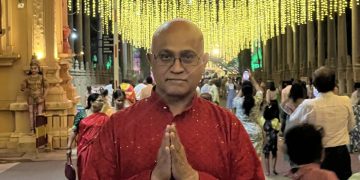By Guruji Dr Satish Prakash
In August each year, we gather in temples, homes and public spaces to celebrate Shri Krishna’s Birthday. In an effort to understand this festival, it is important that we find out for ourselves the kind of inspiration we can have from celebrating this birthday.
Shri Krishna lived approximately 5000 years ago, and his name is associated with the famous Mahabharata War that saw the Pandavas and Kauravas engage in battle with each other. A deep study of the Bhagavad Gita will lead thinkers to understand that this historical Mahabharata War points to another kind of battle, a psychological one, between forces of virtue and those of vice. Such a war rages in our personality every minute of the day. This daily battle is fought every time we have to choose between knowledge and ignorance, good and evil, life and death, health and disease, reality and appearance, and self-control and indulgence. At the commencement of the historical battle, we read in the Gita of Dhrita-rashtra, the blind father of the Kauravas, asking Sanjaya, his wise messenger, to provide details of the battle. “What happened to Duryodhan and my ninety-nine sons [the Kauravas] when they were challenged by Arjuna and Pandu’s four other sons [the Pandavas]? Which side won?” he asked.
To better understand this psychological war and how it impacts us, we need to understand the following principal characters and what they represent:
1. Pandu: Pure, discriminative Intellect.
2. Pandavas [Pandu’s sons]: Positive discriminative tendencies, born from pure Intellect.
3. Arjuna [Pandu’s principal son]: Qualities like rectitude, prowess, courage. Arjuna is he who seeks to become A-rajju, without the binding ropes of Ignorance.
4. Dhrita-rashtra: Mind – blind, sense-infatuated.
5. Kauravas [Dhrita-rashtra’s sons]: Wicked sense tendencies, born from the blind Mind.
6. Duryodhan [Dhrita-rashtra’s eldest son]: Material desire, lit., difficult to subdue.
7. Duryodhan’s 99 siblings: Lust, anger, greed, infatuation, vanity, hate, jealousy, dishonesty, meanness, impatience, arrogance, conceit, revengefulness, cowardice, ungratefulness, pretense, procrastination, laziness, superstition, and all such other qualities.
8. Sanjaya: The intuitive process, an impartial witness to the inner psychological battle. He is ever-victorious.
9. Krishna: The attractive master Teacher who, with conviction in his voice, thrills and uplifts people with Vedic Teachings, showing them the path to spiritual freedom. Krishna was an illumined Being, an undistorted reflection of God’s Qualities – a perfected human being, who attained complete liberation.
In studying the above-mentioned psychological characters, we understand how Duryodhan [material desire], surrounded by negative qualities [like lust, anger, greed and others] can be successfully challenged by Arjuna [rectitude, prowess, courage, etc.], and how the Kauravas, wicked sense tendencies, can be ultimately defeated by the Pandavas, positive discriminative tendencies. However, to make this happen we must befriend Sanjaya, the intuitive process, the impartial witness to the inner psychological battle. We will consequently hear the attractive voice of Krishna, the master Teacher who, with conviction in his voice, thrills and uplifts mankind with Vedic Teachings, showing them the path to spiritual freedom. Historically, Krishna was an illumined Being, an undistorted reflection of God’s Qualities – a perfected human being, who attained complete liberation.
Every year, in celebrating Shri Krishna’s Birthday, we have been singing songs, offering flowers and fruits and waving lights. This year, in an effort to win the psychological battle, can’t we resolve to celebrate a little differently? Can’t we blow a trumpet on the battlefield of life to announce that we must seek to protect virtue and destroy vice and thus re-establish Dharma on firm foundations? This is exactly what Shri Krishna said in Chapter Four of the Bhagavad Gita when Arjuna asked the reason for him being born in this world. This would be, in my opinion, the best inspiration we can derive from this year’s Shri Krishna Janam Ashtami celebrations. Come, let us assemble to celebrate Shri Krishna and the Vedic message he gave 5000 years ago in the Bhagavad Gita. Let us collectively overcome our challenges and win the battle! Namaste!
DR SATISH PRAKASH




































































